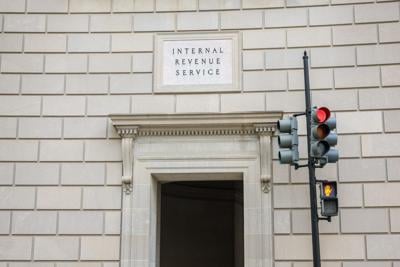
The IRS Building on Feb. 20, 2025, in Washington, D.C. (Credit: Photo by Tasos Katopodis/Getty Images)
Immigrant rights groups are warning that a new data-sharing agreement between the IRS and the Department of Homeland Security (DHS) will further marginalize undocumented immigrants and threaten billions in tax revenue.
The DHS can now access taxpayer data from the IRS to facilitate deportations, according to a memo released by the Treasury Department in early April. The change was among the flurry of the Trump administration’s anti-immigrant actions since the start of his second term.
According to the memo’s language, the IRS would share the taxpayer information of immigrants under criminal investigation and subject to final removal orders with Immigration and Customs Enforcement (ICE). The federal tax code prohibits the IRS from sharing taxpayer records, but it makes a narrow exception for when an individual is under criminal investigation.
But ICE officials told IRS counterparts that they would intend to use tax information to help deport as many as 7 million people, according to New York Times reporting. This is “far more people than the government could plausibly investigate, or who are plausibly subject to criminal immigration penalties,” leaders of New York University’s Tax Law Center wrote in a recent web post. This suggests that the DHS intends to pursue tax data for civil deportation and that “any ‘criminal investigation’ is a false pretext to get around the law,” the authors wrote.
The specific data ICE would be able to request is redacted in the memo, but the privacy of taxpayer information has historically been key to encouraging undocumented people to file their taxes.
The move by the IRS was so unpopular that several high-ranking officials announced their resignation. IRS Acting Commissioner Melanie Krause announced she would be resigning shortly after the memo was made public, and a source told CNN that the last draft of the memo she was involved with was different from the final agreement. Chief Privacy Officer Kathleen Walters also decided to leave. Rajiv Uppal, the chief information officer at the IRS, announced his resignation the day before the filing deadline for taxpayers. Others had already resigned soon after Donald Trump began his second term.
For decades, undocumented immigrants have relied on individual tax identification numbers (ITINs) to pay their taxes and participate in the community. The U.S. Department of the Treasury created the ITIN program in 1996 to give immigrants without a Social Security number a way to comply with U.S. tax laws.
As of the end of 2022, the IRS had issued 26 million ITINs since the start of the program. That year, more than 5.8 million ITINs were active, and almost 487,000 new ITINs were issued. Over the decades since the program’s inception, ITINs began being accepted outside of the IRS and became a cornerstone for the economic and social inclusion of immigrants.
For instance, many community development financial institutions, or CDFIs, specifically support ITIN users, allowing them to create bank accounts and apply for loans to start businesses.
“They were given assurances that this information would not be used against them to target them for deportations,” said Doug Smith, vice president of policy and legal strategy at Inclusive Action for the City (IAC), a Los Angeles-based CDFI. “In fact, they were told that having a history of paying their taxes could help them in their application for legal status in the United States.”
S.744, a bipartisan 2013 bill, proposed creating the status of “registered provisional immigrant,” which would have allowed undocumented immigrants to apply for lawful permanent resident status and enter the naturalization process. The bill passed the Senate but never got a vote in the House of Representatives.
Anticipating that this memo, which had been discussed for months prior, would soon be filed, advocates signed onto a lawsuit, most recently amended on March 26, against the DHS, the Treasury, and the IRS to stop this data sharing. IAC is one of the plaintiffs in this lawsuit.
“We’re taking a stand to protect the rights of our clients and community members, and safeguard their personal data from illegal disclosure,” the group’s CEO, Rudy Espinoza, said in public comments about joining the suit. “We cannot sit idly by as the federal government weaponizes tools of economic inclusion and uses them to exclude and harm taxpayers who contribute so much to our communities.”
There’s a widespread misconception that undocumented immigrants don’t pay taxes. But in 2022, undocumented immigrants paid $96.7 billion in federal, state, and local taxes to federal, state, and local governments, according to a report by the Institute on Taxation and Economic Policy (ITEP). More than a third of that money went toward public services that undocumented immigrants cannot access. For instance, $25.7 billion went to Social Security, $6.4 billion to Medicare, and $1.8 billion to unemployment.
Now, undocumented immigrants must question whether they could be targeted because they filed their taxes in the past or if filing in the future would put them at an even worse risk, putting this source of revenue in jeopardy. States and communities with high immigrant populations will be the most affected.
For instance, in Texas, undocumented immigrants contributed $4.9 billion in tax revenue, according to ITEP.
Immigrant entrepreneurs start small businesses at higher rates than other communities in Texas, especially in border communities. For instance, in the Laredo metro area in 2019, immigrant entrepreneurs made up 53.3% of business owners in top industries, according to a study on the economic contribution of immigrants in Texas border communities.
“It’s a direct attack on not just the undocumented, but the small businesses that we have here in this community,” said Gabriel Rosales, Texas director of League of United Latin American Citizens. “It’s going to be a direct hit to working people, especially here in San Antonio, Dallas, and Fort Worth. It’s going to disproportionately hit us harder than anyone else.”











(0) comments
Welcome to the discussion.
Log In
Keep it Clean. Please avoid obscene, vulgar, lewd, racist or sexually-oriented language.
PLEASE TURN OFF YOUR CAPS LOCK.
Don't Threaten. Threats of harming another person will not be tolerated.
Be Truthful. Don't knowingly lie about anyone or anything.
Be Nice. No racism, sexism or any sort of -ism that is degrading to another person.
Be Proactive. Use the 'Report' link on each comment to let us know of abusive posts.
Share with Us. We'd love to hear eyewitness accounts, the history behind an article.